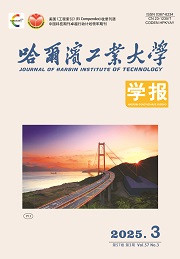| 引用本文: | 冯岩,龙莹莹,王中伟,刘霞,周波,齐晶瑶,于衍真.三维电催化曝气生物滤池的构建及降解布洛芬效能[J].哈尔滨工业大学学报,2019,51(8):37.DOI:10.11918/j.issn.0367-6234.201807023 |
| FENG Yan,LONG Yingying,WANG Zhongwei,LIU Xia,ZHOU Bo,QI Jingyao,YU Yanzhen.Construction of three dimensional electrocatalytic biological aerated filter (TDE-BAF) and its degradation efficiency of ibuprofen[J].Journal of Harbin Institute of Technology,2019,51(8):37.DOI:10.11918/j.issn.0367-6234.201807023 |
|
| |
|
|
| 本文已被:浏览 1294次 下载 1361次 |

码上扫一扫! |
|
|
| 三维电催化曝气生物滤池的构建及降解布洛芬效能 |
|
冯岩1,2,龙莹莹1,王中伟3,刘霞4,周波5,齐晶瑶2,于衍真1,6
|
|
(1.济南大学 土木建筑学院,济南 250022; 2.哈尔滨工业大学 环境学院,哈尔滨 150090; 3.光大水务(济南)有限公司, 济南 250100; 4.中国石油集团西部钻探工程有限公司克拉玛依钻井公司,新疆 克拉玛依 834000; 5.洛阳水利勘测设计有限责任公司,河南 洛阳 471000; 6.齐鲁工业学院 土木建筑学院,济南 250022)
|
|
| 摘要: |
| 针对常规污水处理工艺对城市污水中以布洛芬为代表的难降解PPCPs类有机物降解效能较弱、结构复杂和活化能高等问题,构建三维电催化曝气生物滤池(TDE-BAF),并用其处理城市污水中以布洛芬为代表的难处理PPCPs类有机污染物.结果表明:TDE-BAF对布洛芬的去除效能明显比BAF高,在水温(21.14±0.05)℃、COD( 86.82±3.40)mg/L、TOC(27.56±1.08)mg/L、布洛芬(93.2±5.16)μg/L、氨氮(18.75±2.39)mg/L条件下,布洛芬出水质量浓度分别为2.28~9.32 μg/L、57.70~77.12 μg/L,平均去除率分别为93.48%和31.89%,比单独BAF布洛芬去除率提高了61.59%;TDE-BAF反应器对布洛芬的去除主要集中在TDE(T5-T6)区域,布洛芬的去除率达51.78%,占总去除率的55.40%.TDE-BAF系统降解布洛芬的作用机制主要是在同一个反应器内通过内循环,发挥了三维电催化和曝气生物滤池协同作用. |
| 关键词: 布洛芬 曝气生物滤池 三维电极 协同作用 空间特性 |
| DOI:10.11918/j.issn.0367-6234.201807023 |
| 分类号:X703.1 |
| 文献标识码:A |
| 基金项目:国家自然基金(NSFC515082277);山东省重点研发计划(2017GSF217011);山东省自然科学基金(ZR2017MEE048) |
|
| Construction of three dimensional electrocatalytic biological aerated filter (TDE-BAF) and its degradation efficiency of ibuprofen |
|
FENG Yan1,2,LONG Yingying1,WANG Zhongwei3,LIU Xia4,ZHOU Bo5,QI Jingyao2,YU Yanzhen1,6
|
|
(1.School of Civil Engineering and Architecture, University of Jinan, Jinan 250022, China; 2.School of Environment, Harbin Institute of Technology, Harbin 150090, China; 3.Everbright Water (Jinan) Co., Ltd., Jinan 250100, China; 4. CNPC Xibu Drilling Engineering Co., Ltd., Karamay Drilling Company, Karamay 834000, Xinjiang, China; 5.Luoyang Water Conservancy Survey and Design Co., Ltd., Luoyang 471000, He'nan, China; 6.School of Civil Engineering and Architecture, Qilu Institute of Technology, Ji'nan 250022, China)
|
| Abstract: |
| For conventional wastewater treatment process, the pharmaceutical and personal care products (PPCPs) represented by ibuprofen in municipal wastewater have problems such as weak degradation efficiency, complex structure, and high activation energy. Therefore, based on the internal operational characteristics of biological aerated filter (BAF) and three dimensional electrocatalysis (TDE), a TDE-BAF was constructed to treat ibuprofen in municipal wastewater. Test results revealed that the ibuprofen removal efficiency of TDE-BAF was higher than that of BAF. With water temperature of (21.14±0.05) ℃, COD of (86.82±3.40) mg/L, TOC of (27.56±1.08) mg/L, ibuprofen of (93.2±5.16) μg/L, and ammonia nitrogen of (18.75±2.39) mg/L, the effluent concentrations of ibuprofen were 2.28-9.32 and 57.70-77.12 μg/L, and the average removal rates were 93.48% and 31.89%, which was 61.59% higher than BAF treatment. The removal of ibuprofen by TDE-BAE was mainly in the TDE area (T5-T6), and the removal rate reached 51.78%, accounting for 55.40% of the total removal rate. The mechanism of TDE-BAF degradation of ibuprofen is mainly through the synergistic effect of the TDE and the BAF. |
| Key words: ibuprofen biological aerated filter three dimensional electrocatalysis synergistic effect spatial character |
|
|
|
|







